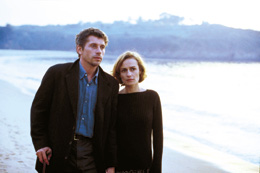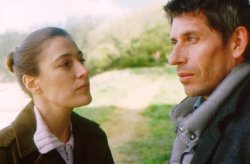dir. claude chabrol
scr. odile barski, claude chabrol
st. jacques gamblin, sandrine bonnaire, antoines de caunes, valeria bruni-tedeschi
dop. eduardo serra
music. matthieu chabrol
 Easily one of the highlights of the festival, The Colour of Lies is a testament of mature restraint, of the artistry of deception and the sort of complicated relationships one always finds in French films. Set in a provincial seaside village, all the characters know each other but wear masks and cover their tracks. Specifically, it is a film about not knowing the one you love, being surprised by yourself - an adulterer, a murderer, a liar, a fraud.
Easily one of the highlights of the festival, The Colour of Lies is a testament of mature restraint, of the artistry of deception and the sort of complicated relationships one always finds in French films. Set in a provincial seaside village, all the characters know each other but wear masks and cover their tracks. Specifically, it is a film about not knowing the one you love, being surprised by yourself - an adulterer, a murderer, a liar, a fraud.
Sympathy. There is a great love of highly developed characters, of story, evident in this film. A fence who trades in stolen antiquities and in love with a teenage babysitter, loans his dinghy to Rene, the artist suspected of raping and killing one of his young students. Then there's the purposeful inspector, an outsider who arrives with her youth and authority, a child, stories of brittany, more caring and curious than career-driven or horrified. Chabrol's intelligence and presence inveighs on every scene. Each is like a memory, unalterable in their relation to each other, like so many fragments of story, encounters like accidents, Rene and the nervous girl at the gate - she wants a red dress, but we never find out why. The cuckold jokes with the cuckoo, invites him over for dinner and takes him home when he gets too drunk. This is the way the new wave ends ... not with a bang but a solemn whisper, the immaculate expiring sigh of intellectual bravura. The film hints with gravity and grief that such sincerity and solemnity is no longer appropriate without cynicism, happiness, self-contradiction, the bullshit of irony, auto da fe criticism. Maybe it's so, but am I wrong to ask for just a little joy? When I go the cinema these days I want to see inspiration, ideas of exaltation, flashes of genius.
 Now this is an excellent film but not a great one. Why? Because for all its concentration it lacks this energy. In it's search for solidity it emulsifies as an understated murder mystery - a new pattern, but still lard. It is clever and amusing but it doesn't punch the viewer when it should. There is a formal perfection in the decor and deliberately overlit sets, design and dialogue placed in such stark contrast, so precise and matter of fact, clinical c'est la vie conversations dry-brushed into the film like cloudy skies, consistent grey-blue, grey-green colour schemes - muted colours of weariness, an agedness that still incubates some bright faces and dialogue but also hints at emptiness, the solitude and self-doubt of an artist seeking confirmation of greatness before fading from the scene. While it is the work of a master it misses the personal investment of genius. It doesn't have the presence, the intensity! Maybe it comes at the wrong time in my life, when I am too impatient, impertinent, greedy. I want intensity, I want the conviction to make general declarations like I needed to see this, this makes a difference, this is what we've been waiting for! Of course this is pure frustration, an irrational claim to judge any film by, but in this climate of cultural recyling we seem desperately short of epiphany, especially in Australian cinemas.
Now this is an excellent film but not a great one. Why? Because for all its concentration it lacks this energy. In it's search for solidity it emulsifies as an understated murder mystery - a new pattern, but still lard. It is clever and amusing but it doesn't punch the viewer when it should. There is a formal perfection in the decor and deliberately overlit sets, design and dialogue placed in such stark contrast, so precise and matter of fact, clinical c'est la vie conversations dry-brushed into the film like cloudy skies, consistent grey-blue, grey-green colour schemes - muted colours of weariness, an agedness that still incubates some bright faces and dialogue but also hints at emptiness, the solitude and self-doubt of an artist seeking confirmation of greatness before fading from the scene. While it is the work of a master it misses the personal investment of genius. It doesn't have the presence, the intensity! Maybe it comes at the wrong time in my life, when I am too impatient, impertinent, greedy. I want intensity, I want the conviction to make general declarations like I needed to see this, this makes a difference, this is what we've been waiting for! Of course this is pure frustration, an irrational claim to judge any film by, but in this climate of cultural recyling we seem desperately short of epiphany, especially in Australian cinemas.
The School of Flesh (L'Ecole de la Chair, dir. Benoit Jacquot, st. Isabelle Huppert, Vincent Martinez) suggests I am unfair in targeting Chabrol's film for this outburst, as it attempts similar expose of painful human intimacies but is marred by the cut-out, pin-up quality of its players, the coldness of their characters and this unbearable sexuality that renders the film as derivative and pretentious. Huppert's character is an admirably strong female role, but for some contrived balance, falls hopelessly into obsessive love with a young gigolo, which detracts from any unconventional attitude or representation it may have offered. The women end up being little more than needy empty vessels, rejected by men they disappoint with repetitive teary scenes of self-implosion.
The film's pace is lost in the ugliness of sex as exploitation, unlike The Colour of Lies where the editing is almost too tight, as if a shortage of film constricts each scene to very abrupt shots, the camera refusing to linger, not even on the corpse of the murdered girl. There is no silence at the end of important lines, the film consequently posesses an air of assured mastery, an urgency to get on with the investigation. It is a composition of very dry brushstrokes, with slightly bitter aftertaste - the coolth in the earth, fog in the air, tainted love in peoples words, eyes that turn grey, white walls with painted shelves (trompe l'oeil), banter heavy with poisoned politness, false ambition, lost inspiration, passionless attraction, cold wit, jealousy, inadequacy - the need for walking sticks, prozac, young girls, penis injections, blue dresses, red dresses, a muse, a suspect, a conviction. There are so many more details that privately amuse me: The inspector's photocube, the way Rene and Viviane eat breakfast in bed and spread marmalade with a teaspoon, the clouds I saw this afternoon, my crazy handwriting jotting down notes afterwards. It is these that I remember, which make me glad to have seen these films.
eugene chew Also in toto:
comments? email the author
Read our interview with actress Natacha Regnier
Check out what actor Benoit Magimel had to say
Return to the 1999 French Film Festival index